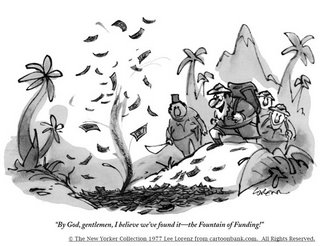"The United Nations in Your Wallet"

The United Nations is salivating at the prospect of tapping the wallets of developed nations through taxes or surcharges on anything that "globalized": commerce, use of the internet, and now airline tickets.
Sally McNamara, Director of International Relations at the American Legislative Council, reports at Townhall:
In spite of some pretty torrid scandals in recent years, the United Nations (U.N.) is far from finished. In fact, Kofi Annan, Secretary General of the U.N., is leading the gambit for perhaps its biggest power-grab yet – independent tax-raising powers or globo-taxation.
In fact, the U.N. is deeply committed to establishing this ‘sovereign’ power for itself – independent of the scrutiny and direction of its large aid donors (namely the United States). It wraps this concept up in the intentionally boring globo-speak of ‘enhanced dialogues on tax co-operation’ and ‘new innovative funding mechanisms,’ but that is just intended to put a pretty bow on top of a very ugly concept – the removal of the exclusive sovereign power of nation states to levy taxes on its citizenry.
Cliff Kincaid, President of America’s Survival, Inc., has just published a devastating chronology of the U.N.’s sustained campaign for global taxes, noting the 2001 High Level Panel on Financing for Development as a turning-point in the debate. Not only did that meeting call for the establishment of an International Tax Organization, it blatantly outlined two major areas where globotaxation might easily be levied – a currency transactions tax and a carbon tax – both of which would disproportionately hit the U.S.
Since then, a succession of high-level meetings, summits and conferences have been busy gathering steam for this concept: the Millennium Development Goals, the 2005 World Economic and Social Survey, the World Summit on Sustainable Development, the World Commission Report on the Social Dimension of Globalization and so on and so on; they all share this notion that globotaxation is the most ‘innovative’ solution to long-term funding for the U.N. They propose globotaxes on everything from air transportation to aviation fuel, from airline tickets to carbon emissions, from currency transactions to arms. The list is as ambitious as it is scary. The long arm of the U.N.’s IRS could be in your pocket soon.
One of the U.N.’s more fruitful attempts at global taxation is the formal plan to levy a tax on airline tickets. In November 2005, Brazil, Chile, France, Germany, and Spain issued a joint statement calling for a ‘nationally applied, internationally coordinated’ tax to be levied on air transport travels. The French government has been the first one to bite the bullet, and from July onward, passengers will pay between one and 40 euros on all flights taking off in France. With enthusiastic U.N. support and much back-slapping for President Chirac, Chile has undertaken plans to do the same, with Belgium and Germany currently hovering in the wings to do so. Luckily, both Great Britain and the U.S. have resisted Mr. Annan’s calls for others to follow suit. But make no mistake: the rot has started. Britain’s Liberal Democrats are openly advocating for taxation on aviation fuel as a way of reducing climate change, and with the current spin-over-substance streak running through the Conservative Party, anything is possible from our normally reliable British partners.
Of course, France’s projected annual revenue of $248 million is not nearly enough for the U.N.’s aspirations and the finger-pointing – largely toward to U.S. – is really gathering steam now. Dr. Jeffrey Sachs, special adviser to Secretary General Annan on the Millennium Development Goals, has gone as far as to say that the U.S. is coming up short in its global aid commitments to the tune of $65 billion a year. Of course, Dr. Sachs is a vocal proponent of globo-taxation to make up the difference. At the 2002 International Conference on Financing for Development, Dr. Sachs helpfully points out that: “A global tax on carbon-emitting fossil fuels might be the way to begin”.
The undercurrent of this debate should not be ignored – any global tax will not be a tax on income, at least not at first; there wouldf be riots in the streets if that happened. Any global tax will stealthy enacted and will have to be far-removed from the scrutiny of ordinary taxpayers. So, what better way to circumvent the problem than to tax corporate America, especially the energy companies who both the U.N. and the European Union have been collectively obsessed with since President Bush refused to ratify the Kyoto Protocol. Feeding on media hysteria about imminent global disaster and excessive corporate profits, the proposition seems easier and easier to sell from a public relations perspective.
There is maybe a glimmer of hope though. John Bolton, the ever-sensible U.S. ambassador to the U.N., has flat-out said that the United States accepts neither global aid targets nor global taxes, and President Bush has backed him. But it cannot always be assumed that the White House will be this sensible. Indeed, Bill Clinton told the Millennium Summit in 2000 that national sovereignty needed to be put aside for the sake of a more active U.N.. And for activism you can read – more of the same, with a tax raising platform to boot.
I would never vote for this, and it seems that cavalier politicians play over the heads of the American people.



0 Comments:
Post a Comment
<< Home